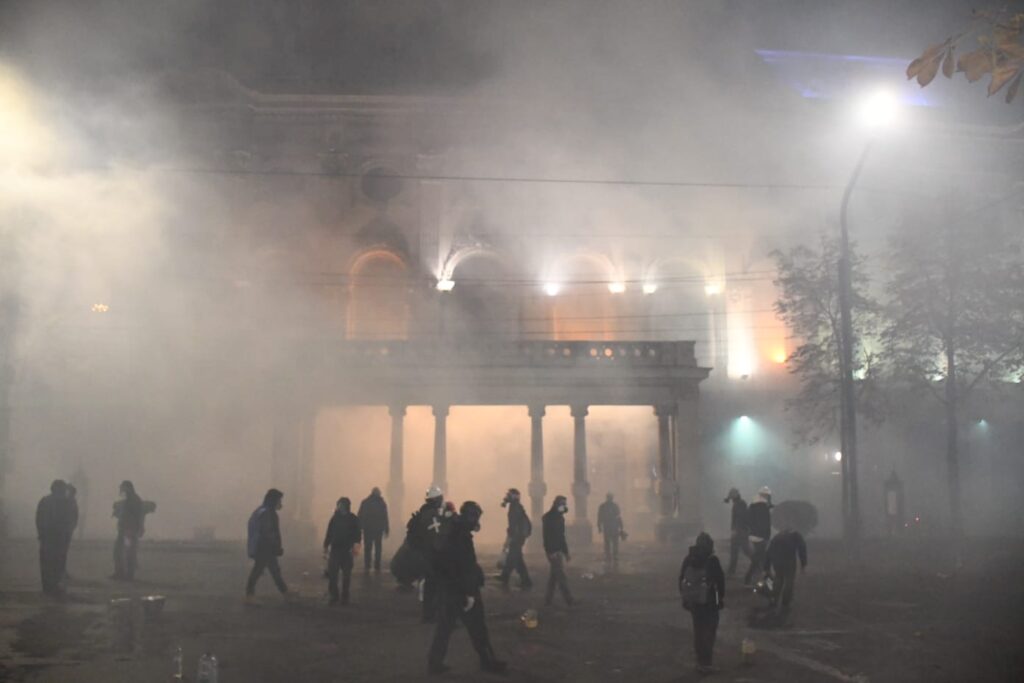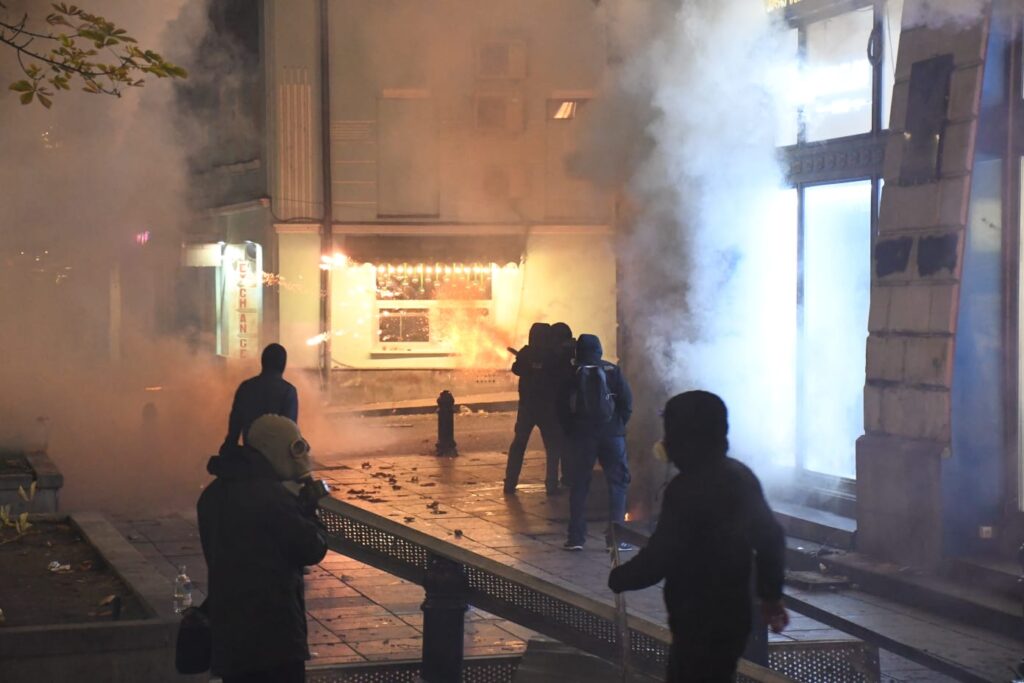Protests continued unabated for fifth day over Georgia’s EU U-turn

During the fifth day of protest in front of the parliament of Georgia, confrontations between protesters using fireworks and riot police using water cannons, tear gas, paper spray, and targeted beatings continued overnight. Amid the ongoing unrest, Prime Minister Irakli Kobakhidze offered ‘dialogue in any format’ to those protesting ‘sincerely’.
Reports of law enforcement officers physically abusing detainees and demonstrators continued throughout the day.
In the early morning, Zura Japaridze, the chair of the opposition Girchi party and a leading figure in the larger Coalition for Change group, was arrested on Chavchavadze Avenue in central Tbilisi as riot police pursued protesters. Later he was released.
His lawyer, Vakho Baramashvili, stated that ‘special forces chased him for a kilometre and a half’ this morning before detaining him on Chavchavadze Avenue for several hours.
The Georgian Young Lawyers’ Association (GYLA) stated, citing the lawyers from the Legal Aid Network, that most of the detainees arrested during the overnight protest on 2 December were severely beaten. Some of the detainees are currently being held in a medical facility.
‘They have bruises all over their bodies, and facial injuries – fractures of the nose and jaw. All of the people taken to the clinic have concussions, multiple bruises and hematomas, and have difficulty moving and speaking’.
GYLA reported that law enforcement officers physically abused and used degrading language against detained demonstrators.
‘While beating the detainees, they spat on them, cursed them, and shouted at them. The detainees recall the following phrases: “I’ll stick a baton in your ass” […], ‘You European, since you like fucking in the ass, I’ll stick a club in your ass”’.
GYLA said that after the continuous beating of detainees, ‘the [police] minibus was covered in blood’, and those who got off the minibus were taken through a corridor of riot police, where they were then kicked in the face and back one by one, before being taken to a patrol police car.
Another case was reported by the Rights Georgia, stating that Avtandil Titvinidze, a protester who said he was beaten by riot police during a protest on 30 November, was subsequently taken to a pretrial detention although he required surgery for his injuries.
According to the Rights Georgia group, Titvinidze had an open wound and a fractured nasal bone and was in severe pain but was not taken to a clinic by doctors at the detention center.
‘Avtandil Titvinidze says that several riot police officers severely beat him and broke his nose with a baton’, the organisation reported.
‘He was bleeding from his nose and asked for medical help, but the police officers gave him a used sock and offered to stop the bleeding with it’.
Georgian Public Defender Levan Ioseliani announced today that his representatives have visited 156 individuals detained in recent days, with 124 of them alleging police brutality and inhuman treatment.
‘It’s almost 80%. This is a very concerning figure’, Ioseliani stated.

The Georgian rights group coalition We Vote accused Interior Ministry units of intensifying violence rather than de-escalating it, alleging they swore at protesters, threw stones, and committed crimes by ‘brutally beating [detained protesters] in groups’ after seizing them and dragging them behind police lines.
Soon after tonight’s demonstration in front of the parliament building began at 19:00, the Ministry of Internal Affairs stated that ‘there have already been cases of illegal expressions of protest’.
The riot police started dispersing Monday’s demonstration hours earlier than in previous days.
Outside of Tbilisi, protests continued in other cities across Georgia.
Kobakhidze offers ‘dialogue in any format’ as international condemnation mounts
This morning, Kobakhidze proposed holding direct discussions with ‘sincere protesters’ who were demonstrating against his decision to halt Georgia’s EU integration process.
‘I am not referring to violent groups [but] there are also sincere individuals, and it is precisely for them that we offer to hold discussions in any form and format on any issue. If it turns out they are right, of course, there is nothing to prevent any decisions from being made’, Kobakhidze stated.
Kobakhidze reiterated his gratitude to the Interior Ministry and its head, Vakhtang Gomelauri, for allegedly ‘managing the events with standards higher than those in the US and Europe’ and accused all four major opposition parties of ‘coordinating violence’ at the protests.
The Ukrainian Ministry of Foreign Affairs strongly condemned the ‘ongoing human rights violations and the use of force against peaceful demonstrators in Georgia. Violence will not remain without consequences’, the ministry said.
The ministry added it was ‘perplexed by the Georgian government’s attempts to claim that the country’s European integration continues while its actions demonstrate a pivot toward Moscow’, noting that Ukrainian politicians who ‘once sought to derail Ukraine’s path to the EU and steer it into Russia’s orbit similarly claimed they were merely “pausing” rather than abandoning Ukraine’s European integration’.

On Monday, Lithuania’s Foreign Minister Gabrielius Landsbergis announced that several Georgian officials, including Georgian Dream’s honorary chair Bidzina Ivanishvili and Interior Minister Gomelauri, are now prohibited from entering Lithuania ‘due to their involvement in human rights abuses’.
The list of 11 also includes Gomelauri’s four deputies — Shalva Bedoidze, Ioseb Chelidze, Aleksandre Darakhvelidze, and Giorgi Butkhuzi — the head of the Interior Ministry’s Special Tasks Department Zviad Kharazishvili; his two deputies; the chief of the Ministry’s Patrol Police, Vazha Siradze; and the head of the Central Criminal Police Department at the same ministry, Teimuraz Kupatadze.
Latvia and Estonia issued similar announcements, denying entry to the same list of Georgians for violating ‘human rights’.
Later at the day, at a joint press conference with Baltic foreign ministers, Canadian Foreign Minister Mélanie Joly stated, that ‘Canada is in solidarity with the Georgian people and we are very concerned about what Russia is trying to do in Georgia and in that sense we will follow suit, we will sanction key individuals and also businesses, entities that are involved either in human rights violations or corruption, based on our own sanctions regime’, she said.
US Senators Jim Risch and Jeanne Shaheen, both senior members of the Senate Foreign Relations Committee, stated they stand with the Georgian people who have a right to peacefully protest.
‘We will work to ensure that the Georgian government and individuals responsible for [parliamentary] election interference, violence against peaceful civilians, and other acts that undermine the territorial integrity of Georgia are held accountable’.
‘We call on the State Department to make its position clear and unequivocal regarding the current use of force against peaceful protestors and we urge the current and incoming administrations to commit to supporting freedom and democracy in Georgia’.
While the senators did not outline concrete actions aside from sanctions they would like to see enacted, they urged the US to ‘use all of the tools at the disposal of the US government’.
‘The Georgian people deserve to know that the United States will not sit idly by as this situation deteriorates’.









